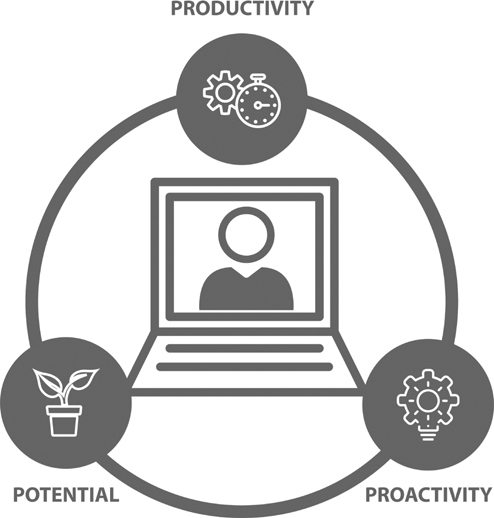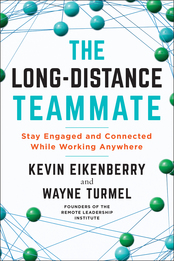Chapter 1
The 3P Model for Remote-Work Success
Alice has worked in the main office for five years and has great relationships with her coworkers, her manager, and people throughout the organization. Six months ago, she moved to another city and was able to retain her position. Everything was going great—until lately.
While she began working with people she knew, there have since been additions to the team. She doesn’t know these people as well and doesn’t go to them for assistance like she does her long-time colleagues. Last week, a new project was announced, and for the first time, she wasn’t approached about being part of the team. More than that, it seems there are more meetings than ever, and they seem to accomplish less. As a remote team member, she doesn’t know when to give her input—or if it is even wanted.
Even though she is doing her job, she feels less motivated to go the extra mile than she used to. She told a friend, “I’m just not as connected to the job as I used to be.”
What Alice is going through is not unusual. When we begin working remotely, we are often energized. No commute! We can work in our Led Zeppelin T-shirt! We can take the kids to school and get so much more done when they’re not there!
Over time, though, studies show that our productivity, the quality of our relationships, and our overall engagement may begin to decline. Some of that is the natural result of the novelty of a welcome situation wearing off. After the honeymoon phase, you’re left with the day-to-day reality of working without regular social interaction, knowing what is going on, or having access to the boss or your coworkers whenever you want it.
In working with managers and remote workers around the world, we have spent a lot of time asking what makes someone successful when they work apart from everyone else. This was a trickier question than we thought, because what does it mean to be successful?
■Is success getting your work done every day? Does it stop there?
■Does success mean you are getting promoted regularly?
■Does success mean you are satisfied with your work-life balance?
■Do you have satisfying work relationships that make your day enjoyable?
There are almost as many definitions of success as there are people. So we asked ourselves, Is there a common thread among workers who, regardless of the work they do, are engaged, productive, and satisfied with their work?
There is.
The 3P Model of Remote-Work Success
We have identified three factors that impact the overall quality of remote work. Three areas that, if you give them the attention they deserve, can greatly enhance the quality of your work, enhance your relationships with others, and help you create the kind of workplace and long-term success you desire, even when you don’t work in the company’s headquarters or right under your boss’s nose.
This model introduces the concept of the 3Ps (see figure 1). Here’s our definition of each factor:
Productivity
Not surprisingly, “Productivity” is the top of the model. That seems simple enough. After all, getting the job done is typically the prime factor in whether you keep a job, regardless of where you work. This is the question most organizations ask themselves when considering remote work: Will we get at least as much quality work from someone if they don’t work alongside everyone else?

Figure 1. The 3P Model
If you started working from home so you could get work done without constant interruptions and the day-to-day craziness of the office, this might seem like a no-brainer. But getting tasks accomplished is not the same as being productive.
By definition, productivity is the measure of work yielding results, benefits, or profits. It is about outcomes, not activity. So while it isn’t unusual for remote workers to be busy, the question isn’t so much “Are you working?” as “What are you working on?” “How’s it going?” and “What does it bring to the team’s goals and outcomes?”
A team member focuses on their work and tasks. A teammate considers not only how to be personally productive to get the most and best work done in the time allotted, but how to help the rest of the team and organization meet its goals.
You probably know that remote workers work plenty of hours. But working hard and putting in lots of hours isn’t the same as being productive. Face it, your work is always within arm’s reach and calling your name. It’s hard to disconnect. You hear, or say, things like:
■I’ll just work a little bit more after the kids go to bed.
■Instead of watching TV tonight, I’ll just catch up on my email.
At the end of the day, real productivity is about getting more of the right or best things done—not how much time you spent doing it.
In the rest of the book we’ll examine the mindset, skills, and habits we can develop to help us maintain our productivity, even when we’re uninspired, uncertain of what we’re doing, or just plain exhausted.
Proactivity
Perhaps the most surprising thing we uncovered in our research was the one word that both managers and workers agreed best described a great remote teammate. That word was proactivity.
The technical definition of the word proactive is “acting in anticipation of future problems, needs, or changes.”1 Translated to our work, that means thinking longer term and bigger picture. Being proactive is the opposite of being reactive.
Here’s a simple example. The best and safest drivers are proactive by looking further down the road. They notice what’s right in front of them while adjusting to what is further ahead. They drive straighter, drive more smoothly, and are far safer. Reactive drivers are looking barely past the hood of their vehicle. A ride with them will be far less enjoyable, jerkier, and likely less safe.
It makes sense that managers want team members who think bigger and into the future. Proactive teammates don’t wait to be told what to do and ask the questions that could help them be more productive. But there are several not-so-obvious ways that proactivity is especially valuable when working remotely.
When we think of someone being proactive, we usually think of the motto “If you see something, say something.” A good teammate will offer suggestions if a colleague is struggling. They’ll speak up in a meeting if a point needs to be made. If a task must be completed, they will offer to help. That behavior is obvious and highly valued.
But when we dug behind the answers, we found a different form of proactivity that was neither as obvious nor as common. It isn’t just about tasks, it’s also about your mindset.
When you have a question about your work, do you ask for clarification immediately or do you just try to work through it? In coaching conversations, do you accept that your manager isn’t talking about your personal development plan or do you raise the subject yourself? When that meeting is running long, do you speak up and try to get the team back on track or do you sit back, roll your eyes, and go answer your email instead?
Both managers and team members say that the thing they look for most in a teammate is that kind of initiative. It requires bravery, trust, and engagement but may be the single most important component in your long-term success as a remote worker.
Potential
Finally, do you consider the long-term implications of your work and the choices you make? This is perhaps the most difficult thing about working remotely, and often contributes to our feelings of isolation and disengagement over time.
By putting your head down and focusing on your own work, have you taken yourself off your manager’s radar for future assignments?
Perhaps you are so focused on completing an assignment that you have appeared rude or pushy to others. Have you considered what that snippy email might mean in the future, or is accomplishing this task right now the only thing on your mind?
When you are in the middle of something, and just trying to get the job done and move on, it’s easy to forget that short-term decisions can have long-term impacts.
For your teammates, one inconsiderate moment might not matter, but if it becomes a pattern, it will certainly change how they think of you.
Your manager is looking at your behavior, decision making, and engagement over a longer time frame than just this one task or project. If you take a pass on this assignment or don’t participate in a particular discussion, what will it mean for future interactions and opportunities?
What is your goal for this job in the short term? What do you want to accomplish here? How do you feel you can make the biggest contribution, and what are your goals long term? Does it help you build the skills and experience you desire? And how does this role fit into your vision for yourself?
Many of us spend too little time thinking about this, and yet it is important to your long-term engagement, job satisfaction, and career goals. If it’s so critical, why don’t we think and talk about it more often?
Everything we do has both immediate and long-term impact. Are you focused on the immediate need, or do you consider the potential results of your activities, behavior, and communication style?
Let’s look at three examples:
■Office politics. It’s not uncommon when we work away from the office to be blissfully unaware of what’s going on in the workplace, smugly believing that we are above or immune to office politics. But is the fact that you are not aware of upcoming decisions or haven’t built relationships with decision makers part of the reason you seem stalled at your current position?
■Transactional communication. One of the traps when we work remotely is a tendency for our work, our communication, and our planning to become very transactional. We need to finish this task, and we’re not overly concerned if Bob in Accounting likes it—at least until we need a favor from Bob. Are you taking the time to tend to the relationship and create some friendly interaction or are you focusing completely on the transactional work?
■Tuning out in meetings. Meetings can seem like an interruption to our work. It’s a hassle to contribute when the people in the conference room are always dominating the conversation anyway. If we tune out, we can’t be surprised that people don’t seek our input or consider us interested. If the people in the office don’t know what we bring to the party, why should they even invite us?
Thinking long term and about your potential isn’t natural and doesn’t come easily when you’re extinguishing the latest fire or just trying to get that task done and off your list.
You’re already working away from others. If you consider productivity, proactivity, and potential, odds are you’ll be more than a remote worker, you’ll be a great teammate and member of the organization.
Pause and Reflect
▶Overall, how productive do you feel you are most days?
▶How happy are you with your proactivity? (How would your peers answer that question about you?)
▶Who would you identify as a role model for proactivity that you could learn from?
▶How often do you think about your potential in your work and career? Is it enough?
Online Resource
For an activity to help you apply the 3P Model for yourself in your work now, register at the website:
LongDistanceTeammate.com/resources
and request the 3P Model Activity.










